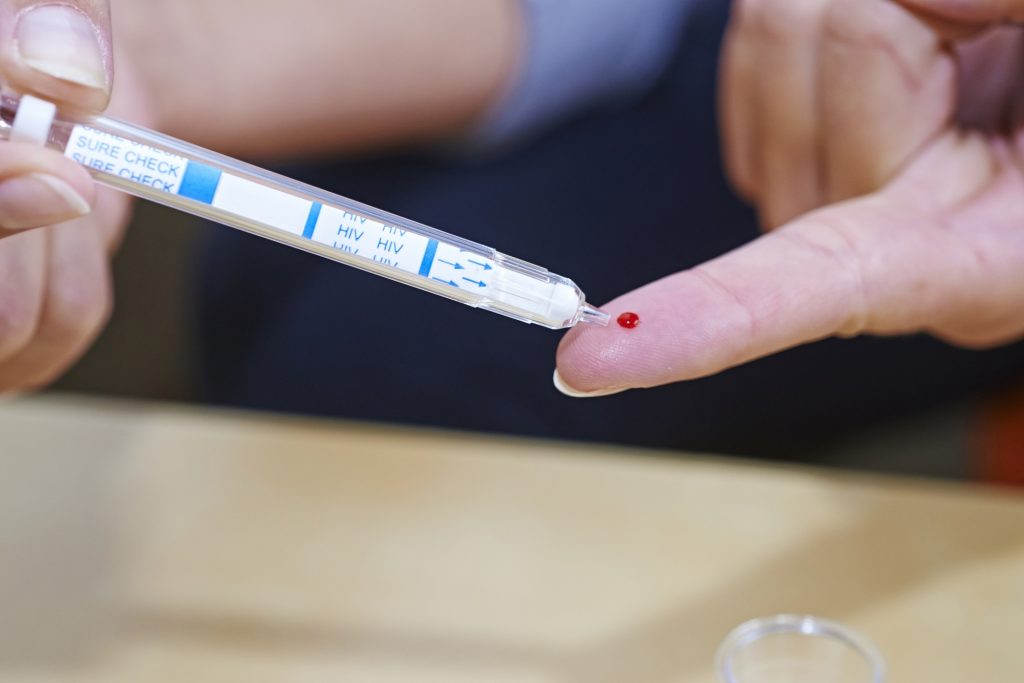Pathalogy
Rapid HIV testing is available now in Mutare, Harare and Masvingo s as part of pilot programs and studies into the effectiveness of the new testing technology.
There is no extra charge for people who choose to take the Rapid HIV Test as a part of an STI check.
Rapid HIV Tests are not good for diagnosing early infection.
The standard blood test is the best method for detecting early HIV infection as it often detects it two to three weeks after infection.
Currently Taylor Square Private Clinic is only offering the Rapid HIV Test to people who make an appointment. The clinic is performing the finger prick rapid HIV test.
***Rapid HIV Tests available at no extra charge (by appointment)

The aim of the rapid testing process is to make the testing take no longer than 30 minutes in total. Generally, when you arrive, you are provided with information on HIV rapid testing. The test is then performed by a finger prick blood sample.
The test works by detecting the antibodies that are produced by the immune system as a response to HIV infection. After 20 minutes or so, the test kit will react to the antibodies (if they’re present, of course) producing what’s known as a ‘reactive result’. This doesn’t mean you’re HIV positive. A reactive result is considered preliminary so blood will also be taken and sent to the lab for a standard HIV blood test.
While you’re waiting for the rapid test result, nursing staff will take some blood so the lab can test for HIV, as well as syphilis and hepatitis. If you elect to also be tested for STIs you will be asked to provide a throat swab, genital swab and urine sample so you can also be tested for chlamydia and gonorrhea.
You will then have a short wait of 5 -10 minutes. You are then called back in to get the result of your rapid test.
The results of your lab-based HIV and STI tests will be available up to one week later. The lab-based HIV test will confirm your rapid test result.
To contact Private Clinic please call our friendly reception staff on: 0770 751 360 and mention that you want a Rapid HIV Test.
Like laboratory-based HIV tests, rapid HIV tests have a window period. The window period is the time between being infected with HIV and the appearance of detectable antibodies to the virus.
While most people will produce antibodies to HIV in less than six weeks from infection, the window period for rapid tests is three months. This means that if you have had a recent exposure to HIV, the rapid test may not detect an infection.
There are three types of results that you could get from a Rapid HIV Test:
• Non-reactive – HIV antibodies were not detected in the sample. It’s important to note that people in the ‘window period’ might also receive a non-reactive result.
• Reactive – HIV antibodies were detected in the sample, but this result needs to be confirmed with laboratory based blood testing. As rapid HIV tests are very sensitive, a reactive response can be triggered by a number of things not HIV related. If a reactive response occurs, there is a small chance that this reactive response is a false response (not related to HIV).
• Invalid – there is a small possibility that the rapid test may show an invalid response. This result is not an indication of a person’s HIV status. In this situation a person will be offered a repeat rapid test.
Remember that all these results are only preliminary and blood will still need to be sent to the laboratory for full testing
HEPATITIS C
Get Ready for New Hepatitis C Treatments
Call us to see one of our doctors for assessment: 077 331 6151
Hepatitis C is a virus that infects the liver. The virus spreads through any type of blood‐to‐blood contact and in some circumstances by receptive anal intercourse.
Taylor Square Clinic
• Globally, about 150 million people are chronically infected with the hepatitis C virus, and more than 350 000 people die every year from hepatitis C‐related liver diseases.
• More than 233,000 Zimbabweans are living with chronic hepatitis C, which is defined as having had the infection for longer than six months. About 25% of those living with chronic hepatitis C in Zimbabwe have moderate to severe liver disease.
• The symptoms of chronic hepatitis C can take years to emerge, however liver damage can progress silently and people living with hepatitis C may feel well. Left untreated it can lead to cirrhosis (scarring of the liver), liver cancer and liver failure. It is estimated that around 15% of people living with chronic hepatitis C in Zimbabwe have not yet been diagnosed.
• Sharing drug injecting equipment is the principle route of hepatitis C transmission in Zimbabwe. Needle and syringe programs are effective in helping to stop the spread of hepatitis C. Education about blood awareness and transmission risks is also critical.
• There is no vaccine to protect against hepatitis C, but the infection can be treated and cured. Innovative new treatments which are tablet only, without interferon injections, will be available in Zimbabwe in early 2025. These new treatments have extremely high cure rates.
To contact Taylor Square Private Clinic please call our friendly reception staff on: 077 331 6151
Source: www.hepatitisaustralia.com.
